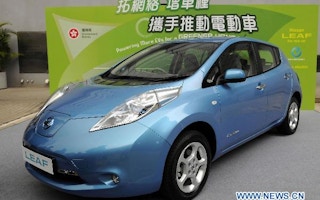The plug-in hybrid Chevy Volt, made by General Motors Co, and the all-electric Nissan Leaf save on fuel , but the size and weight of their battery packs add significant crash protection as well.
“The Leaf and Volt’s extra mass gives them a safety advantage over other small cars,” Joe Nolan, chief administrative officer of the Insurance Institute for Highway Safety said on Tuesday.
The closely watched group, underwritten by insurance companies, crash tested the two first generation 2011 plug-ins that were introduced late last year as the ultimate for consumers in fuel economy.
Both earned top safety ratings, an early validation for experts who say automakers do not have to sacrifice safety for better fuel economy, that advanced technologies can achieve both.
The strong marks for front, side and rear crash protection also indicate automakers are using the same safety engineering in electric cars as they do in traditional gas-powered vehicles.
“What powers the wheels is different, but the level of safety for the Volt and Leaf is as high as any of our other top crash test performers,” Nolan said.
GM and other manufacturers have lagged Toyota Motor Corp and other Asian manufacturers in developing fuel-saving gasoline/electric hybrids, which account for only a fraction of the U.S. sales market.
They hope their plug-in variants will better compete and catch on with those consumers demanding improved mileage performance in their daily commutes, especially with pump prices steadily rising and averaging $3.88 a gallon nationally. Gas in some areas already exceeds $4.
The Volt and the Leaf are classified as small cars but their battery packs raise their weight closer to mid-size and larger ones.
The Leaf weighs 3,370 pounds while the Volt is about 3,760 pounds. Nissan’s Altima, a midsize, weighs about 3,200 pounds and the Chevy Impala, a large family car, 3,500 pounds. Heavier cars generally do a better job of protecting people in crashes but they do less well on fuel savings.
The findings also contrasted with a lackluster Volt endorsement earlier this year from Consumer Reports on efficiency.
David Champion, director of Consumer Reports auto test center told Reuters in February that the Volt was fun to drive but did not make sense financially to operate.
He said consumers seeking value and top fuel efficiency would be better off buying a top-performing hybrid like Toyota’s Prius or a Fusion by Ford Motor Corp.
GM said the review was hasty.










